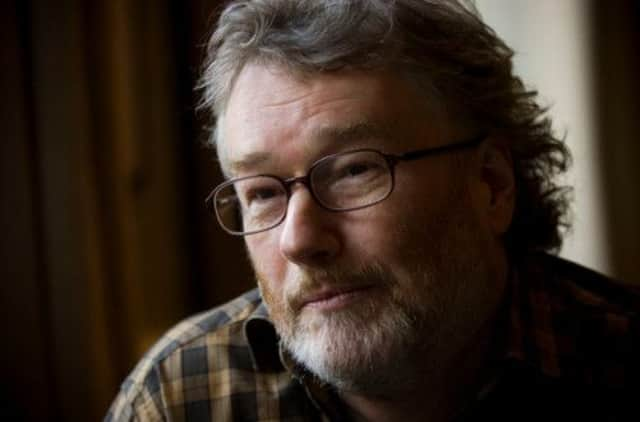Scottish author Iain Banks dies aged 59


Iain Banks, a giant of literature, died on Sunday at the age of 59, just weeks after announcing he had gall bladder cancer and just months to live.
His wife, Adele Hartley, wrote on Banksophilia, a website devoted to the author: “Iain died in the early hours this morning. His death was calm and without pain.”
Advertisement
Hide AdAdvertisement
Hide AdClose friend and fellow-author Ken MacLeod said his passing would leave “a large gap in the Scottish literary scene.” Best known for his novels The Wasp Factory, The Crow Road and Complicity, Banks was included on a list of The 50 greatest British writers since 1945 five years ago.
The Wasp Factory, his debut work, was listed as one of the best 100 books of the 20th Century in a 1997 poll.
In total he produced 29 novels, 14 works of science fiction and 15 mainstream titles, including his final book, The Quarry.
His publisher Little, Brown said Banks was “an irreplaceable part of the literary world”.
Advertisement
Hide AdAdvertisement
Hide AdLiterary critic Stuart Kelly said: “When they come to write the literary history of the late 20th century and early 21st century, I am sure that Iain’s place in it will be both central and secure.”
MacLeod said that he had last visited Banks at his home in North Queensferry on Wednesday last week and had been surprised at how tired he seemed. He said was in a “state of some disbelief” at his death.
MacLeod added: “The personality that his fans can see through his writings is very as he was. He was exuberant, curious, compassionate and questioning. That’s what he was like.”
Crime writer Ian Rankin, said he was shocked by the timing of Banks’ death. He said that on Tuesday, Banks’ wife Adele had been told he might still have months to live, but his condition deteriorated rapidly. But added that his friend – who famously asked his Adele to “become his widow” shortly after being diagnosed – had maintained his wit until the end.
Advertisement
Hide AdAdvertisement
Hide AdRankin said: “When I saw him a few weeks ago at one of his favourite bars in Edinburgh I said to him ‘sorry I didn’t get you a wedding present, what do you get for the man who has everything?’
“He said ‘well, maybe a cure’.
“He was refusing to take cancer seriously, in the same way that he refused to take life seriously. For him it was a fantastic, exciting, bizarre game.”
He said that the author had created a unique body of work: “You didn’t know what you were going to get. That first book, The Wasp Factory, was unlike any contemporary novel that was being published at the time, and the books he wrote after that were all different in exciting and unusual ways. He had a very childlike imagination, he was fascinated by everything, he had a child’s wonder at the universe, a child’s wonder at language, and he never lost that sense of wonder or sense of humour.”
News of his death came on the day that it emerged his latest novel, The Quarry, would detail the terrible physical and emotional impact of the cancer that cut short his life. The fictional book reflects the last few weeks in the life of Guy, a man who is terminally ill with the cancer.
Advertisement
Hide AdAdvertisement
Hide AdBanks had begun writing his final novel prior to being was diagnosed with gall bladder cancer in March. To be writing a book about cancer appeared a bizarre premonition.
Speaking about his illness in a interview with Kirsty Wark, due to be broadcast later this month to coincide with publication of his novel, Banks revealed he was some 87,000 words into writing the book when he was diagnosed.
“I had no inkling. So it wasn’t as though this is a response to the disease or anything, the book had been kind of ready to go,” he said. “And then 10,000 words from the end, as it turned out, I suddenly discovered that I had cancer.” Little, Brown said the author was presented with finished copies three weeks ago.
In his most recent post on Banksophilia, on 20 May, the author had thanked his fans and friends for their messages of support. “It means a lot, almost more than I can say, and – whatever type or size of screen I read the comments on – I come away from the computer, laptop, iPad or phone with a happy smile on my face,” he wrote.
Advertisement
Hide AdAdvertisement
Hide AdBorn in Fife, Banks studied at Stirling University before taking a series of jobs, including for IBM, British Steel and a London law firm, before The Wasp Factory was published in 1984, allowing him to write full-time.
His first science fiction novel, Consider Phlebas, in 1987, was published under the name Iain M Banks, a distinction that he continued down the years.
Banks’ 1992 novel, The Crow Road, saw his work make the transition to television, when it was adapted by the BBC as a four part series starring Joseph McFadden, Bill Paterson, Dougray Scott and Peter Capaldi.
Complicity, was adapted for the big screen. Other works such as the sci-fi novel The State of the Art became radio productions, while The Bridge was adapted for the stage.
READ MORE